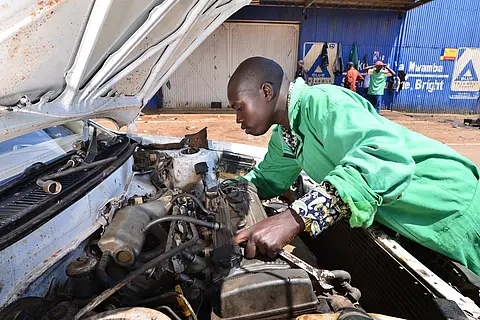RESEARCH TRIANGLE PARK — A team from RTI International, a nonprofit research institute, was among the winners of the 2019 Collaborating, Learning, and Adapting (CLA) Case Competition, sponsored by the United States Agency for International Development’s (USAID) Bureau for Policy, Planning and Learning and the LEARN contract. The competition awarded just ten winners from 97 submissions.
Led by RTI experts Ehud Gachugu and Sarah Mattingly, RTI’s winning case, “Strengthening Kenya’s TVET capacity through learning and adaptation,” explored how the USAID Kenya Youth Employment and Skills (K-YES) program used CLA to improve youth employment training.
The RTI-implemented K-YES program aims to increase employment opportunities for youth in Kenya, which has one of the highest rates of youth unemployment globally. K-YES works in partnership with Technical and Vocational Education and Training (TVET) institutions in Kenya to improve youth employment training through enhancing their capacity, service delivery, partnerships, and sustainability. Challenges include boosting relevance and quality of training and improving the public image of TVETs.
K-YES has embraced CLA in both phases of its implementation to ensure continuous learning and adaptation. Phase one focused on capturing critical lessons working with an initial cohort of TVETs, while phase two focused on incorporating those lessons with a new cohort. This approach supported the TVETs to develop institutional strengthening plans and implement their own CLA activities. It has led to a 39 percent increase in performance scores by the second group of TVETs and has helped K-YES reach more than 200,000 marginalized youth with access to employment support services overall.
The program’s approach to CLA also enhances Kenya’s self-reliance by linking the vocational training center ecosystem with national reforms; engaging local stakeholders, including private sector companies and county governments; enhancing the capacity of TVETs to self-assess and develop institutional strengthening plans; and supporting local ownership of TVET activities.
RTI has a proven track record leveraging Monitoring, Evaluation, Research, Learning, and Adapting (MERLA) to guide and improve international development program management and outcomes in more than 28 countries across multiple technical sectors. Learn more about RTI’s MERLA approach.

Photo credit: Alex Kamweru
- A team from RTI International was among the winners of the 2019 Collaborating, Learning, and Adapting (CLA) Case Competition, sponsored by USAID.
- Led by RTI experts Ehud Gachugu and Sarah Mattingly, RTI’s winning case explored how the USAID Kenya Youth Employment and Skills (K-YES) program used CLA to improve youth employment training.
RTI International Media Relations: